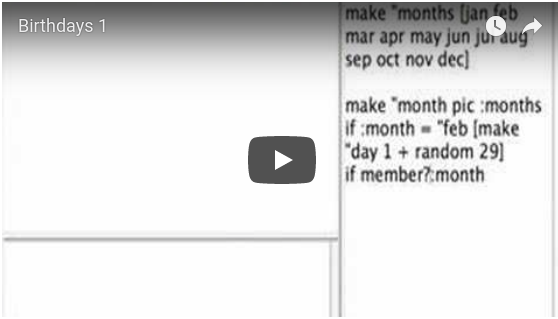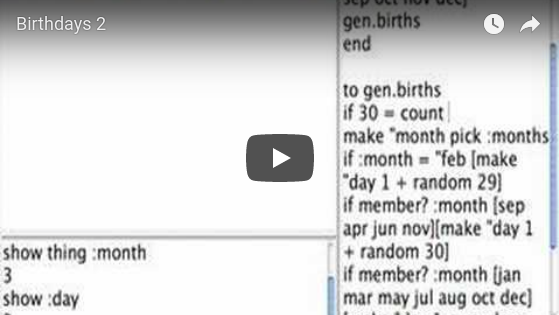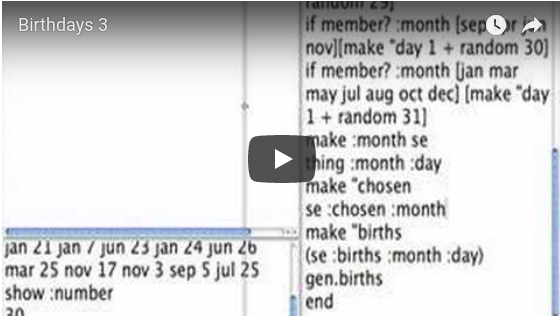logothings
Birthday Party
What’s the likelihood that two people in a crowd will have the same birthday?
Does it matter in what month you were born?
Does it matter how big or small the crowd is?
I didn’t understand the problem. I thought there were magic numbers. So what I did was write a program to solve the problem as I understood it.
So this is about how I got the computer to randomly select a specific number of birthdays, then check to see if there was a match. As I tested one component another idea would pop up until finally I got a working program.
Generating Random Dates
to get.births make "months [jan feb mar apr may jun jul aug sep oct nov dec] gen.births end to gen.births make "month pic :months if :month = "feb [make "day 1 + random 29] if member? :month [sep apr jun nov][make "day 1 + random 30] if member? :month [jan mar may jul aug oct dec] [make "day 1 + random 31] make :month se thing :month :day gen.births end
There’s a typing bug. The word pic is not correct; it needs to be pick.
Below is an example of what happens when I run get.births and then
look at the variables.
get.births show :month oct show :day 4 show thing :month 4 show :oct 4
to get.births make "months [jan feb mar apr may jun jul aug sep oct nov dec] make "number 0 make "births [] gen.births end to gen.births if 30 = :number [stop] make "month pick :months if :month = "feb [make "day 1 + random 29] if member? :month [sep apr jun nov][make "day 1 + random 30] if member? :month [jan mar may jul aug oct dec] [make "day 1 + random 31] make :month se thing :month :day make "number :number + 1 make "births (se :births :month :day) gen.births end </pre< And after running get.births, here is an example of what the variables contain.show :number 30show :births jun 10 dec 3 mar 21 feb 5 jan 20 may 12 sep 24 dec 9 apr 16 mar 4 jul 19 jun 11 apr 26 apr 10 jan 14 oct 20 jul 29 oct 29 dec 12 nov 27 feb 25 nov 6 nov 29 apr 5 sep 7 may 5 mar 5 jan 13 aug 8 jul 24After looking this over I see some more changes need to be made. We need to collect the picked months and we can get the number of them by using count. [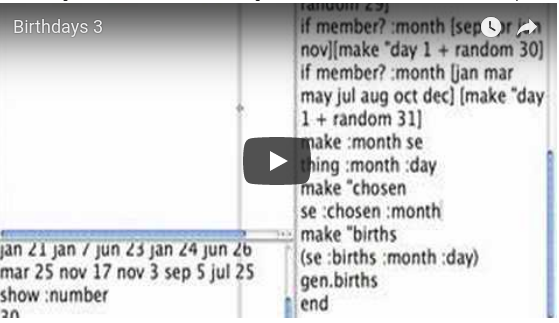](https://youtu.be/KP8O6_YG4N4)to get.births make "months [jan feb mar apr may jun jul aug sep oct nov dec] make "chosen [] make "births [] gen.births end to gen.births if 30 = count :chosen [stop] make "month pick :months if :month = "feb [make "day 1 + random 29] if member? :month [sep apr jun nov][make "day 1 + random 30] if member? :month [jan mar may jul aug oct dec] [make "day 1 + random 31] make :month se thing :month :day make "chosen se :chosen :month make "births (se :births :month :day) gen.births endThis works sort of. The big bug is that `:oct` or `:sep` needs to be reset to empty after each running of `get.birth`. The following procedure will do that:to reset :cal if :cal = [][stop] make first :cal [] reset bf :cal end[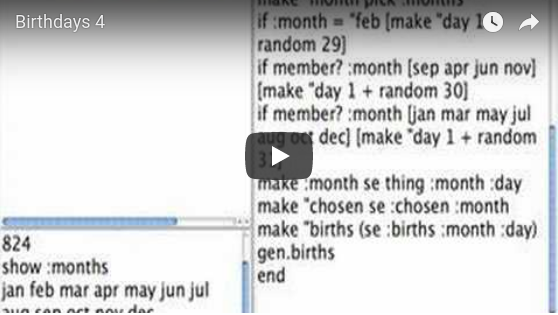](https://youtu.be/k0b7Lo0-lJw) Now we have procedures that will generate 30 random dates. The next thing we need to do is check to see if there are two dates that are the same. ## Checking the Birthdays for a Duplicate Let's find out if there are two birthdays on the same date. [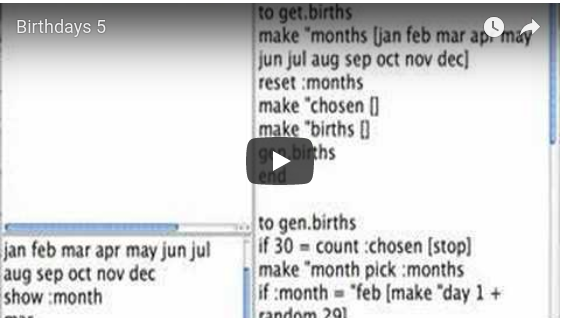](https://youtu.be/lC5RUybFCEA) The job is to look at each month and see if its list of days has two that are the same. [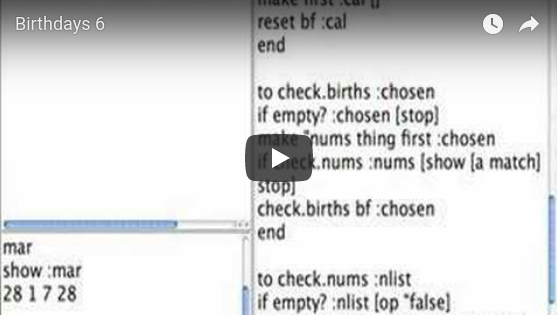](https://youtu.be/Ssuz3p7CJkU) Here is listing of the procedures we have so far:to get.births make "months [jan feb mar apr may jun jul aug sep oct nov dec] reset :months make "chosen [] make "births [] gen.births check.births :months end to gen.births if 30 = count :chosen [stop] make "month pick :months if :month = "feb [make "day 1 + random 29] if member? :month [sep apr jun nov][make "day 1 + random 30] if member? :month [jan mar may jul aug oct dec] [make "day 1 + random 31] make :month se thing :month :day make "chosen se :chosen :month make "births (se :births :month :day) gen.births end to reset :cal if empty? :cal [stop] make first :cal [] reset bf :cal end to check.births :chosen if empty? :chosen [stop] make "nums thing first :chosen if check.nums :nums [show (se first :chosen :nums [a match]) stop] check.births bf :chosen end to check.nums :nlist if empty? :nlist [op "false] if member? first :nlist bf :nlist [op "true] op check.nums bf :nlist end## The final program: The final version of the birthday program, let's you run batches of birthday groups of different sizes. The superprocedure, `test.births`, takes two inputs, the number of times to run `gen.births` and the size of the group for the birthday search. In the process the data is collected in the variables, `janh`, `febh`, etc. and printed at the end.
to test.births :times :groupsize make “matches 0 make “history [janh febh marh aprh mayh junh julh augh seph octh novh dech] zap :history repeat :times [gen.births] show :matches show printout :history end
to gen.births make “births [] make “months [jan feb mar apr may jun jul aug sep oct nov dec] reset :months get.births check.births :months end
to get.births if :groupsize = count :chosen [stop] make “month pick :months if :month = “feb [make :month se thing :month 1 + random 29 ] if member? :month[apr sep jun nov][make :month se thing :month 1 + random 30] if member? :month [jan mar may jul aug oct dec] [make :month se thing :month 1 + random 31] make “births se :births se :month last thing :month make “chosen se :chosen :month get.births end
to reset :cal if :cal = [][stop] make first :cal [] reset bf :cal end
to zap :cal if :cal = [][stop] make first :cal 0 zap bf :cal end
to check.births :chosen if empty? :chosen [stop ] make “nums thing first :chosen make “hmonth word first :chosen “h if check.nums :nums [make “matches :matches + 1 make :hmonth 1 + thing :hmonth stop] check.births bf :chosen end
to check.nums :nlist if empty? :listofnums [op “false] if member? first :nlist bf :nlist [ op “true ] op check.nums bf :nlist end
to printout :hist if empty? :hist [op []] op se se bl first :hist thing first :hist printout bf :hist end </pre>
